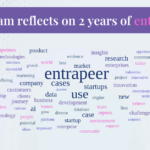
In an era defined by rapid technological evolution, businesses across all industries face a pressing need to adapt and innovate. This transformation is not as simple as adopting new technologies. It means leveraging these emerging technologies to revolutionize how companies operate, engage with customers, and deliver value in an increasingly digital world.
Once a buzzword, “digital transformation” has now become a central strategy for companies aiming to thrive in a digitized world. But what exactly does this entail, and how can organizations harness digital transformation solutions to stay ahead? This article delves into the essence of digital transformation services and outlines how entrapeer can be your ally in this journey.
Understanding Digital Transformation
At its core, digital transformation involves integrating digital technology into all areas of an enterprise, fundamentally changing how you operate and deliver value to customers. Rather than merely upgrading IT infrastructure, this approach demands a holistic strategy focused on reevaluating old operating models, improving agility in strategic planning, and promoting a culture of innovation throughout the organization.
Digital transformation solutions encompass a broad range of services designed to assist companies in this complex transition. These services can include cloud computing, big data analytics, artificial intelligence (AI), machine learning (ML), the Internet of Things (IoT), and blockchain, among others. Generally speaking, the goal is to enhance efficiency, improve customer experiences, and foster innovation.
Why is Digital Transformation Essential?
Data transformation is essential because it enables organizations to convert raw data into a format that is suitable for analysis, making it a critical step in the data analytics process. By transforming data, businesses can ensure its quality, consistency, and compatibility across various systems and applications, facilitating seamless integration and interoperability.
This process not only enhances the accuracy and reliability of data-driven insights but also supports advanced analytics and machine learning initiatives by preparing data in a way that algorithms can efficiently process and analyze it. Consequently, data transformation plays a pivotal role in empowering organizations to:
- Unlock the full potential of their data assets
- Drive informed decision-making
- Optimize operations
- Gain a competitive edge
The Role of Digital Transformation in Key Industries
From optimizing supply chains and manufacturing processes to enhancing customer engagement and implementing sustainable practices, the potential use cases for digital transformation are vast and varied. For the sake of brevity, we’d like to highlight a few applications based on our most recent (and most exciting) client research.
Read on for some of the latest digital transformation solutions across automotive, telecommunications, banking, oil and gas, energy, logistics, airlines and aviation, manufacturing, and retail.
Digital Transformation in the Automotive Industry
Digital transformation has revolutionized the automotive industry, transforming how vehicles are manufactured, operated, and serviced. Here are some key ways digital transformation is impacting the automotive industry:
- Integration of AI and IoT devices in vehicles to enable advanced driver assistance systems and autonomous driving capabilities.
- Adoption of digital platforms for connected car services, such as remote vehicle diagnostics, predictive maintenance, and over-the-air software updates.
- Use of data analytics to optimize supply chain management, improve manufacturing processes, and enhance customer experiences.
- Addressing new challenges related to cybersecurity, data privacy, and regulatory compliance in the digital era.
Digital transformation is driving innovation and enabling automotive companies to deliver safer, more connected, and environmentally friendly vehicles. By embracing digital technologies, the automotive industry is shaping the future of mobility and transforming the way people travel.
Digital Transformation in Telco
The telecommunications industry is undergoing significant digital transformation to meet the evolving needs of customers and keep pace with technological advancements. Here are some key ways digital transformation is impacting the telco industry:
- Leveraging data analytics and AI to gain insights into customer behavior, preferences, and usage patterns, enabling personalized offerings and targeted marketing campaigns.
- Transformation of traditional communication networks to next-generation networks based on cloud computing and virtualization technologies.
- Adoption of innovative business models and services, such as IoT connectivity, smart home solutions, fintech partnerships, and digital entertainment platforms.
- Enhancing customer experience through self-service portals, chatbots, and personalized interactions across multiple channels.
- Evolution of telcos into digital service providers, offering a range of digital services beyond traditional voice and data connectivity.
Digital transformation is enabling telcos to innovate, improve operational efficiency, and deliver enhanced services to customers. By embracing digital technologies, the telco industry is transforming the way people connect and communicate in the digital age.
Digital Transformation in Banking
The banking industry is undergoing significant digital transformation to meet the changing expectations of customers and stay competitive in the digital era. Here are some key ways digital transformation is impacting the banking industry:
- Strengthening cybersecurity measures to protect customer data and prevent financial fraud in the digital age.
- Streamlining and digitizing core banking processes, such as account opening, loan processing, and payments, to enhance operational efficiency and customer experience.
- Leveraging data analytics and AI to gain insights into customer behavior, identify cross-selling opportunities, and personalized banking services.
- Embracing fintech partnerships and collaborations to offer innovative financial products and services, such as mobile payments, digital wallets, and robo-advisory.
- Redesigning branch networks and investing in digital channels to provide hyper-personalizedomnichannel experiences to customers.
Digital transformation is reshaping the banking industry, enabling banks to deliver convenient, personalized, and secure banking services to customers. By embracing digital technologies, the banking industry is transforming the way people manage their finances and interact with financial institutions.
Digital Transformation in Energy and Logistics
The energy and logistics industries are undergoing significant digital transformation to enhance operational efficiency, improve sustainability, and optimize supply chain management. Here are some key ways digital transformation is impacting these industries:
- Integration of IoT devices and sensors to monitor energy consumption, optimize asset performance, and enable predictive maintenance in the energy sector.
- Adoption of digital platforms and data analytics to optimize logistics operations, improve route planning, and enhance supply chain visibility.
- Implementation of smart grid technologies to enable efficient energy distribution, integrate renewable energy sources and support dynamic pricing models.
- Use of drones, robotics, and automation technologies to streamline warehouse operations, reduce manual labor, and improve order fulfillment speed.
- Implementation of digital solutions for energy management, demand response, and energy efficiency to reduce carbon emissions and promote sustainability.
Digital transformation is revolutionizing the energy and logistics industries, enabling businesses to optimize operations, reduce costs, and enhance sustainability. By embracing digital technologies, these industries are transforming the way energy is produced, distributed, and consumed, as well as the way goods are transported and delivered.
Digital Transformation in Airlines and Aviation

The airlines and aviation industry is undergoing significant digital transformation to enhance customer experience, improve operational efficiency, and drive innovation. Here are some key ways digital transformation is impacting the airlines and aviation industry:
- Adoption of digital technologies to enhance the end-to-end customer experience, from online booking and check-in to personalized in-flight entertainment and post-flight feedback.
- Use of data analytics and IT outsourcingto optimize flight operations, improve fuel efficiency, and enhance maintenance processes.
- Implementation of biometrics and facial recognition technologies to streamline airport security processes and improve passenger flow.
- Integration of IoT devices and sensors to enable remote monitoring and predictive maintenance of aircraft systems.
- Embracing digital platforms and partnerships to offer enhanced travel services, such as seamless connectivity, personalized recommendations, and loyalty programs.
Digital transformation is reshaping the airlines and aviation industry, enabling airlines to deliver personalized, seamless, and connected travel experiences. By embracing digital technologies, this industry is transforming the way people travel and improving overall operational efficiency.
Digital Transformation in Manufacturing and Retail
The manufacturing and retail industries are undergoing significant digital transformation to stay competitive, enhance operational efficiency, and meet the changing needs of customers. Here are some key ways digital transformation is impacting these industries:
- Adoption ofIoT devices and sensors to enable real-time monitoring of manufacturing processes, optimize inventory management, and improve supply chain visibility.
- Integration of robotics and automation technologies to improve production efficiency, reduce manual labor, and enhance product quality.
- Implementation of digital platforms and e-commerce solutions to enable online sales, personalized recommendations, and seamless customer experiences.
- Use of data analytics and AI to gain insights into customer behavior, optimize pricing strategies, and improve demand forecasting.
- Embracing digital technologies for virtual reality (VR) and augmented reality (AR) to enhance product visualization, training, and customer engagement.
Digital transformation is revolutionizing the manufacturing and retail industries, enabling businesses to optimize operations, improve customer experiences, and drive growth. By embracing digital technologies, these industries are transforming the way products are produced, marketed, and sold, as well as the way customers shop and interact with brands.
Advantages of Digital Transformation Services
Digital transformation offers numerous advantages for businesses in today’s technology-driven era. Here are some key advantages:
- Increased efficiency through process automation and optimization.
- Data-driven decision-making based on valuable insights and analytics.
- Improved customer experience through personalized interactions and tailored offerings.
- Competitive advantage by staying ahead of market trends and embracing best practices.
- Scalability and flexibility to adapt to changing business requirements and market dynamics.
Entrapeer: Delivering Impactful Digital Transformation Solutions
At entrapeer, we understand the urgency and complexity of digital transformation across all industries. Our mission is to equip businesses with the tools, insights, and connections needed to navigate the digital landscape effectively. Here’s how we can help you discover the best digital transformation solutions for your organization:
Pioneering Use-Case Database
Entrapeer is proud to offer the world’s first and largest database of practical and realized use cases. This unique resource allows users to discover what technologies industry leaders and competitors are implementing, which solution providers they partner with, and the ROI such proof-of-concept (POC) projects yielded.
Verified, Actionable Insights for Decision-Making
Our platform goes beyond simple data aggregation by providing verified results from past POC projects. This ensures that our clients can make evidence-based decisions, offering a level of validation unmatched by our competitors.
Direct Startup Engagement and Network Access
We facilitate immediate, direct engagement with a vast network of innovators – from startups to scaleups and everything in between. Our platform enables swift, one-click communication, and connections, distinguishing entrapeer from services that offer broader, less direct engagement methods.
Customized Market Insight and Trend Analysis
Entrapeer delivers tailored market insights and trend reports, catering to the specific needs of our clients. With our new Instant Research feature, you can even take advantage of our proprietary AI engine to develop custom market research reports in minutes. This bespoke approach to market intelligence sets us apart, offering actionable data that goes beyond general information.
Global Scope with Local Relevance
Our expansive database transcends geographic, cultural, and language barriers, to provide a global perspective with local relevance. This ensures that clients have access to a wide range of insights and opportunities, fostering a more comprehensive understanding of the innovation landscape.
Real-Time Data
With real-time market data, entrapeer offers an unparalleled advantage, continuously updating insights to keep users informed of the latest trends and market shifts. This dynamic approach is crucial for making timely, informed decisions in the rapidly evolving tech landscape.

Embracing Digital Transformation with Entrapeer
Digital transformation is no longer just a bonus for businesses, but rather, a necessity for survival and growth in today’s rapidly evolving world. It enables organizations to stay competitive, improve efficiency, enhance customer experience, and make data-driven decisions. Industries across all sectors are leveraging digital transformation to drive innovation and create new opportunities.
With a pioneering use-case database, verified insights, direct startup engagement, and customized market analysis, entrapeer provides the tools and resources needed to navigate the digital landscape successfully. The real-time market data offered by entrapeer enables enterprises to make informed decisions and seize opportunities in a rapidly changing market.
If you’re looking to embrace digital transformation and get ahead of the technological curve, entrapeer is here to support you every step of the way. Contact us today to learn more about how our solutions can help transform your organization and unlock success.
FAQs
Digital transformation services go beyond traditional IT services by focusing on strategic business transformations through the use of digital technologies. They are designed to redefine business models and processes, whereas IT services typically support existing business operations.
Digital transformation is relevant for companies across all industries, not just technology firms. Any organization can benefit from leveraging digital technologies to improve their operations, customer engagement, and competitive advantage.
Yes, small businesses and startups can significantly benefit from digital transformation by becoming more agile, reaching customers more effectively, and streamlining operations, which can lead to increased growth and competitiveness.
The duration of a digital transformation project varies widely depending on the scope, complexity, and size of the organization. It can range from a few months to several years, with ongoing efforts to adapt and evolve.

